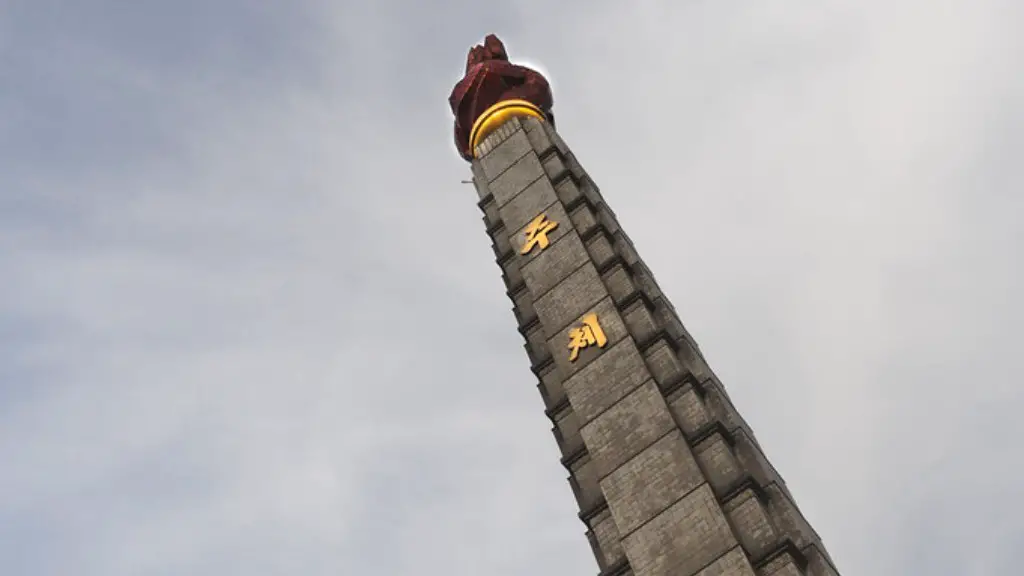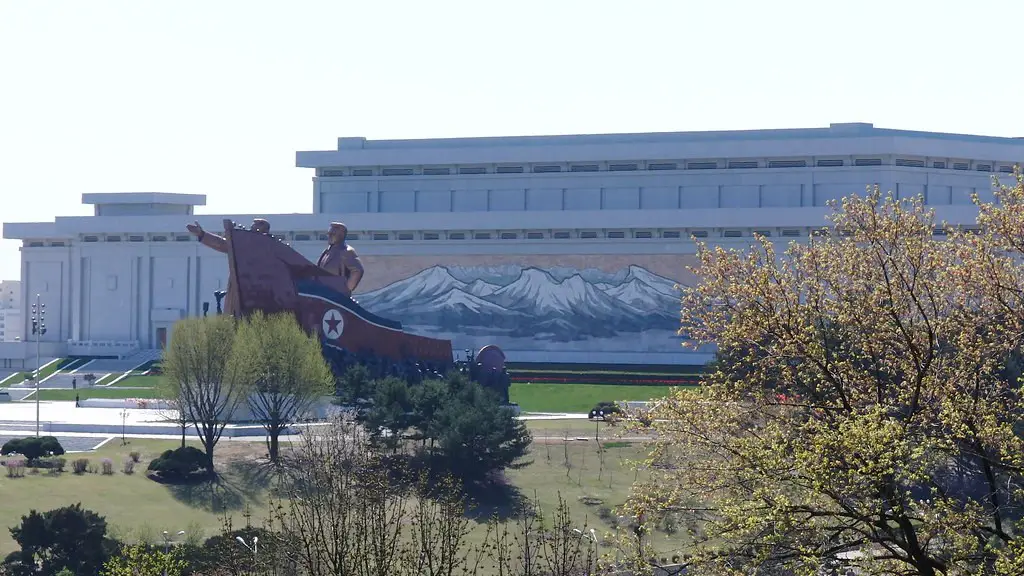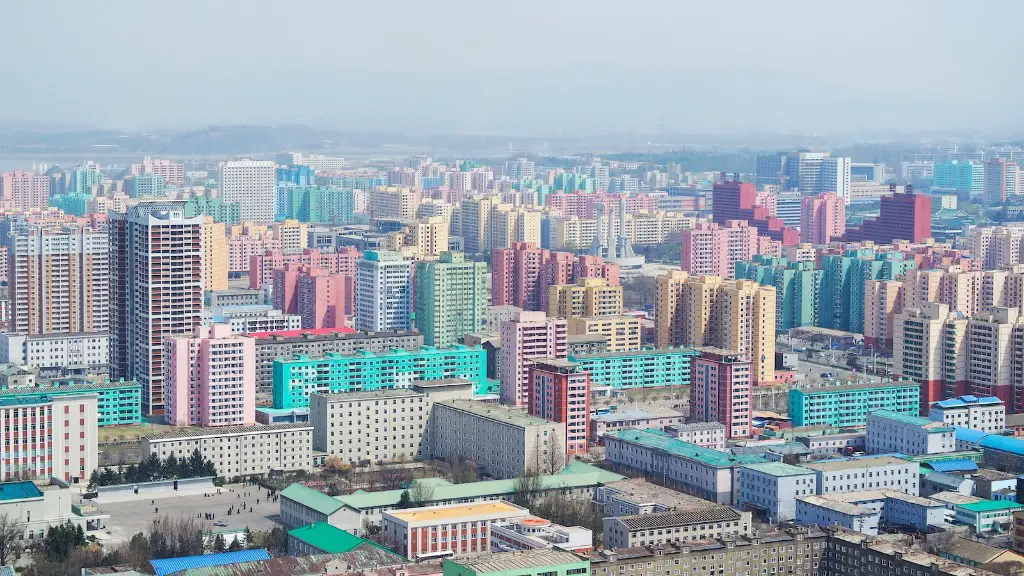Introduction
The world was spellbound last year when news broke out about the North Korean Corona Virus situation. North Korea’s complete lack of confirmed Covid-19 cases has raised a lot of eyebrows and left many asking the same question – why does North Korea have no Covid-19 cases? This article delves into the complex issue to explore why North Korea has the only nation in the world that has yet to report a single case of Covid-19.
Sanctions, Isolation and a Lockdown
North Korea’s absence of Covid-19 cases may not come as a surprise to many given its strict border control, its extremely challenging circumstances, and its diplomatic and economic sanctions imposed by the world. One of the most important policies that the government has put in place is a set of rules that bars anyone from entering the country unless they have certain permission or clearance. This has undoubtedly played a role in protecting North Korea from the virus.
Moreover, North Korea lives in isolation, with very few world nations willing to maintain a relationship with the country. This is largely due to the way the government operates, which has made the nation the target of much criticism and controversy. This limited contact with the rest of the world further decreases the chances for foreign pathogens and infections being able to penetrate the country.
In addition to these barriers and restrictions, the North Korean government quickly implemented a quasi-total lockdown at the beginning of the pandemic in January. Songs, propaganda, and “loyalty pledges” were used to get citizens to comply with the lockdown, which included social distancing, remote working and a suspension of a lot of economic activity. This thorough implementation of a quarantine has also played a large role in preventing the virus from entering North Korea.
Vigilant Medical Inspections and Surveillance
In addition to the strict government policies, North Korea also took proactive measures to protect its citizens from the potential threat of Covid-19. Strict medical inspections at the border have been made in order to detect any foreign pathogens that could have possibly made their way into North Korea.
Furthermore, North Korea has implemented a rigorous surveillance system, which includes intensive testing and contact tracing at both international and national borders. This system has enabled the government to identify any potential cases of the virus very quickly and take the appropriate steps to deal with them.
Moreover, the government has also carried out a series of mandatory disease control programs such as emergency vaccinations and the mass fumigation of public and private buildings to prevent any infections from spreading. This has certainly helped the nation in maintaining their zero-case scenario.
Societal Factors
Apart from the strict policy enforcement and surveillance, there are also a few other factors that may have contributed to the North Korea’s success in containing the virus. One of the most important of these is the nation’s low population density, which has enabled the government to move swiftly and control the spread of the Covid-19 virus effectively.
Furthermore, the reduced foreign travel and tourism culture in North Korea has maintained the country relatively virus-free. North Korea is very unlike most countries that have reopened their borders and allowed people from all sorts of countries and backgrounds to come into their nations. This restriction has meant that no unidentified person can come in with a potential infection and spread it to locals.
This remarkable success in avoiding the virus also comes down to the cultural practices of the North Korean citizens, who are very aware of the importance of hygiene and cleanliness, and are extremely disciplined when it comes to following the government’s orders. In addition, there is also a sense of community responsibility towards the nation, which furthers the society’s ability to protect itself against Covid-19.
Personal Insights and Analysis
North Korea’s success in preventing any cases of Covid-19 is a great example of how an effective lockdown, strong surveillance systems, and responsible social behaviour can help protect a nation from a global pandemic such as this. It is a testament to the dedication and discipline of North Korean citizens, and the North Korean government’s commitment to protecting its people. Despite the sanctions, North Korea has continued to persist and protect its citizens from outside threats.
It is important to recognise that having any zero cases of the virus is an anomaly, and while this may make North Korea an outlier, it may not necessarily be the best example to follow. It must also be noted that the tight control of media and the public’s right to information can also be a potential issue, given that we may never really know the true extent of the Covid-19 situation in North Korea.
Scientific/Medical Perspectives
There have been many medical experts and scientists who have remarked on the North Korean situation. According to University of Pittsburgh professor of infectious disease epidemiology Lee B Wein , North Korea’s success in avoiding a single infection comes down to strategic containment. “It seems the strategies implemented by North Korea have worked to supplement their geographical location and the level of contact the country has with others,” Lee says.
Other experts attribute the zero-case situation to the country’s stringent regulations, policies and surveillance efforts. Prof Frank Smith, a virus transmission expert at the Massachusetts General Hospital, remarks that North Korea has used a variety of measures to prevent the virus from entering the country, including vigorous infection checking at borders, home quarantines and the thorough screening of passengers at the airport.
Global Perspectives
The success of North Korea in avoiding a single confirmed case has been hailed by some world leaders as a great victory. French Prime Minister Edouard Philippe praised North Korea’s “impressive commitment” and noted that “their exemplary actions have been rewarded by such an extraordinary success”.
Similarly, US State Secretary Antony Blinken has commended the North Korean government for their “extraordinary success” and “inspiring achievement” in containing the virus.
However, some observers have voiced concerns about North Korea’s approach to handling the pandemic, criticizing the government’s secrecy and lack of transparency. They are worried that North Korea may be under-reporting their Covid-19 cases. Despite the applause, North Korea’s success in containing the virus needs to be taken with a grain of salt.
Criticisms and Cautious Accolade
The world has both welcomed and criticized the North Korean attitude towards Covid-19. On the one hand, many people have praised North Korea’s success in containing the virus, with some suggesting that the country provides a model for other countries to follow.
On the other hand, there are some who are skeptical and skeptical of North Korea’s approach, citing the secretive nature of the North Korean government. These observers have argued that the country may be under-reporting their cases and the virus is still present – we just do not know about it.
The debate surrounding the North Korean situation is still ongoing and no one can definitively say why the country has not yet reported a single infection. Whatever the reason may be, it is indisputable that the country’s strict policies and government surveillance has played a crucial part in keeping the nation free from Covid-19.
Economics of Covid-19
It must be said that the North Korean situation is not without some economic costs. The country has been greatly affected by the pandemic, with sanctions from the US and the restrictions on commerce taking its toll on the North Korean economy.
The North Korean people have had to cope with shortages in food, medicine and fuel. The government has had to resort to drastic measures such as rationing food and other goods in order to meet the needs of its citizens.
Furthermore, the closure of the North Korean borders and the suspension of some economic activities have hindered North Korea’s ability to earn much-needed money from foreign sources. These economic difficulties have made it even harder for the North Korean government to cope with the pandemic and carry out effective aid measures.
Political Implications
Apart from the economic impacts, there are also political implications to take into consideration. North Korea is a heavily militarised country which relies heavily on its military power to maintain its authority and security. As a result, the lockdown has had an effect on the stability of the army, as restrictions on movement have caused delays in wages and equipment supplies.
This has not only had an impact on the morale of the soldiers, but has also made the government consider various strategies that could be employed to keep the army in check. These strategies have been regarded by some as very authoritarian and not necessarily in line with international standards of human rights.
At the same time, there are still some observers who suggest that North Korea’s strict measures could have been seen as necessary in order to preserve the lives of North Korean citizens and the stability of the country. This debate is likely to continue as North Korea attempts to cope with the scourge of Covid-19.
Conclusion of Statistical Analysis
North Korea’s success in avoiding a single infection has proven to be an extraordinary achievement and has prompted much debate and praise. It is undeniable that the government’s strong policies, the isolation of the country and the responsible behaviour of its citizens have all contributed to this success.
However, one must be mindful that the political and economic costs of this success must not be overlooked. The restrictions placed on foreign travel and the stringent surveillance practices employed by the government may not be seen as compatible with our shared vision of a free, democratic and open society.
It is important to remember that despite the lack of confirmed cases, the Corona Virus pandemic continues to be a major global problem and vigilance and caution remain essential. The Covid-19 situation in North Korea is still shrouded in mystery, and one must take its purported success with a grain of salt.


